Lessons for Lanka: Malaysia’s election story
Dr Kamal Wickremasinghe
 The
election victory in Malaysia by the ruling Barisan Nasional by winning
135 parliamentary seats out of the 222 seat Parliament, and nearly 50
per cent of the popular vote marks another loss for the global regime
change model being tried out by the American neocons in collaboration
with local collaborators. The pin-up boy of the neocons and the global
bogus human rights enterprise, Anwar Ibrahim has lost, marking the end
of his campaign to capture power in Malaysia. The
election victory in Malaysia by the ruling Barisan Nasional by winning
135 parliamentary seats out of the 222 seat Parliament, and nearly 50
per cent of the popular vote marks another loss for the global regime
change model being tried out by the American neocons in collaboration
with local collaborators. The pin-up boy of the neocons and the global
bogus human rights enterprise, Anwar Ibrahim has lost, marking the end
of his campaign to capture power in Malaysia.
The Malaysian election with a record participation rate of 90 per
cent of the country’s 13 million registered voters, despite voting is
not being compulsory, shows the determination of the local population to
defeat the global neocon forces that continue to attempt to undermine
domestic political and social fabric in the developing world through the
financing and exploitation of domestically based anti-national forces.
|
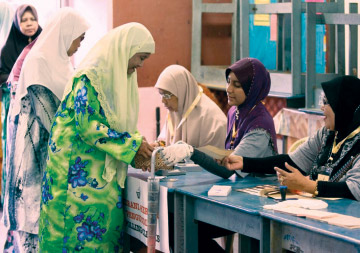
Women line up to vote at a polling station at Penanti in Penang state in
northern Malaysia, May 5, 2013. Picture courtesy: VOA |
The leadership of the opposition coalition that contested the
election as well as the election campaign tactics used by the
“opposition” in Malaysia proved that the attempted strategy was that of
the neocon-CIA conceived “colour revolution” model that has become
ineffectual following the early deceptions in former Soviet Republics
Georgia (2003), Ukraine (2004) and Kyrgyzstan (2005).
The Malaysian election outcome that comes less than a month after the
Venezuelan election is another example that shows, like with all other
frauds aimed at deceiving the public in the developing world, the people
have woken up to the colour revolution fraud.
The history of deception with the promise of Colour Revolutions
The so-called “colour revolutions” was the evil brain child, born at
the dissolution of the Soviet Union in 1991, of the bogus democracy and
human rights promotion industry promoted by the neocon think tanks in
Washington DC.
The neocons were not happy just with the conversion of the Marx and
Engels Museum in Moscow to the Noblemen’s Club, or the replacement of
the statue of Lenin in Tashkent with that of the fourteenth century
Central Asian imperialist Timur; They wanted better and higher rewards
for the success of long-term undermining of the Soviets.
The new fraud was based on achieving the old aim of regime change and
installation of puppet governments, but with the deployment of US ‘soft
power’ rather than overt military invasion that was preserved for
countries in the Middle East that are crucially important for the
“security” of Israel (eg, Iraq and Libya).
The neocons found the ‘bulldozer revolution' used in former
Yugoslavia to force Slobodan Milo53?evi63? from power was too involving,
and formed a body of evidence that could be used in the future for
laying war crimes charges against the US and its NATO “allies”. So they
developed a new tool and ideology for subjugating the world populations.
|
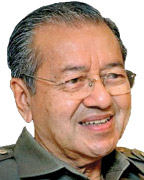
Dr Mahathir Mohamed |
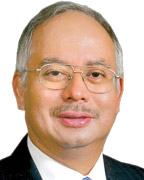
Najib Razak |
|
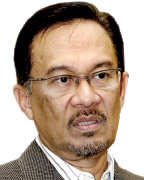
Anwar Ibrahim |
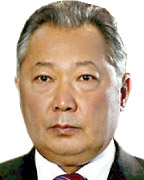
Kurmanbek Bakiyev |
The Colour Revolution model consists of several salient features:
firstly, it is founded around an openly pro-Western local agent renowned
for naïve fascination with the bogus neocon ideals of democracy and
human rights promotion, or simply corrupt, promoted to demagogue status.
The targeted core support is the equally naïve, or corrupt, young
Western oriented university students or graduates.
The chosen local leaders are used by the US embassies in the relevant
country to vehemently reinforce the often baseless, standard, rallying
cry of the need to transform their countries that have become “dens of
corruption” into modern states respecting the “rule of law”. These
movements maintain non-violent and non-partisan pretensions, and they
attempted to cover their inability to make progress through the
democratic election process by invariably accusing national governments
of resorting to electoral fraud.
The standard repertoire of “collective action” aimed at mobilising
the general population include demonstrations, parades, distribution of
protest material, petitions, boycotts, media propaganda, strikes, public
theatre, and even concerts. The neocon sponsored leaders use the common
neocon devised language of globalisation to level charges at the duly
elected national governments backed by the people of the country,with
corruption, lack of transparency, increasing the grip on power, and
stamping down on dissent against being some of their favourite chants.
The form and extent of US support depend on the specific
characteristics of the country and its geopolitical position. Advice,
logistic cooperation and economic assistance is provided through local
organizations worked on specific projects with funds appropriated by the
Congress to the Agency for International Development (USAID) and the
National Endowment for Democracy (NED), a bipartisan NGO founded by
Ronald Reagan in 1982.
The neocon approach to regime change is basically a bipartisan policy
with International institutions of Republican and Democratic parties
facilitating relationships with opposition groups and assisting them in
establishing common political fronts against governments.
The International Republican Institute (IRI) takes over the function
of collective action training and the National Democratic Institute and
the George Soros’ Open Society are in charge of training electoral
“observers” and preparation of exit polls specifically to “demonstrate”
grounds for allegations of electoral fraud.
Freedom House, headed by James Woosley, a former director of the CIA
works as a “rating agency” that target the countries where uprisings
could take place, and of financing courses to social activists with
conservative backgrounds. A man named Gene Sharp, the director of the
CIA-linked Albert Einstein Institution, has written a handbook titled
“From Dictatorship to Democracy”, translated into more than 60
languages.
The Colour Revolution fraud was effective for less than a decade
Colour Revolutions were used by the neocons as proxies for fulfilling
the geostrategic goals by undermining Georgia (2003), Ukraine (2004) and
Kyrgyzstan (2005) in their almost undisguised attempt to control the
Post-Soviet Space and energy corridors in Eurasia before Russia could
start to recover influence in its vicinity. In all three countries,
power was transferred to parties who lost the elections, but held candle
light protests over “electoral fraud”.
People soon woke up to the fact that Colour Revolutions were simply
determining forces for the substitution of elites that failed to produce
social change or actual social revolution. Essentially they were coups
d’ètat performed by domestic collaborators with the support of foreign
secret services and diplomats. The new rulers simply shifted foreign
policy of their countries towards US interests without producing any
benefits to the people.
In Georgia, the failure of the “Rose” Revolution of 2003 described by
the White House as “one of the most powerful movements in the modern
history that has inspired others to seek freedom”, staged by Mikheil
Saakashvili, the epitome of an American puppet, is an example where
elite corruption continued apace under the new crowd.
Finally in 2007, Georgia faced a series of anti-government
demonstration sparked by accusations of murders and corruption levelled
against Saakashvili and his allies by one of his erstwhile associates,
leading to police brutality against the protesters and declaration of
state of emergency. Saakashvili’s United National Movement (UNM) was
spectacularly defeated in the 2012 parliamentary elections.
In Ukraine, Viktor Yanukovych, the man painted as the villain of the
“Orange” Revolution in 2004 returned to office as Prime Minister in
2006. In Kyrgyzstan, “Tulip” Revolution leader Kurmanbek Bakiyev who
quickly established himself as a political strongman fled the country
after violent protests in 2010.
These cases show, in addition to the failure of neocon conspiracy,
that liberal democracy does not offer solutions to political problems in
the developing world and US interest are always incompatible with local
interests of emancipation and strengthening of democratic governments of
the people, by the people and for the people. Notwithstanding such
facts, dollar hungry local collaborators in various countries still go
behind neocon agents, expecting mutual benefits.
The Malaysian election can be seen as the latest in a series of such
subversive attempts struck down by the majority population of a
developing country.
The Malaysian attempt was modelled on the Colour Revolution fraud
The neocon ‘coup’ attempt in Malaysia started back in the late 1990s.
The neocons had clearly identified the then Deputy Prime Minister Anwar
Ibrahim as the sort of ambitious political player with rubbery policies
they could exploit to achieve their aims in this relatively rich,
predominantly Muslim country; Looking at Anwar Ibrahim’s history in
politics, they made the right choice, albeit an unsuccessful one in the
final analysis.
Anwar entered public life in the early 1970s, as the president of a
“Muslim” students’ organisation, and a “Muslim” Youth Movement and the
National Union of Malaysian “Muslim” Students. His unavowed aspiration
to become a “Muslim” leader was clearly on display. He displayed his
continued commitment to pro-Malay policies in this multi-ethnic country
when he renamed the national language from Bahasa Malaysia to Bahasa
Melayu during his tenure as Education Minister (1986-91), earning
criticism from non-Malays as a move that made the national language the
property of Malays, and not all Malaysians.
His popularity was such that in 1993 Anwar was appointed deputy prime
minister by his party, the United Malays National Organisation (UMNO),
making it clear that the Malay political establishment was grooming him
to succeed Dr Mahathir Mohamed as prime minister; Anwar frequently
referred in public to his “son-father” relationship with Mahathir.
However, Anwar’s true personality surfaced during the 1997 “Asian
Financial Crisis”: Anwar, as Finance Minister, supported the
International Monetary Fund (IMF) plan for recovery involving an
austerity package and a free-market approach to the crisis, created in
the first place by free-market currency speculators like George Soros,
whom Dr Mahathir was determined to teach a lesson to. For his troubles,
the Newsweek magazine named Anwar the “Asian of the Year” in 1998.
Anwar was arrested soon after, in 1999, and was subsequently charged
with corruption, for allegedly interfering with Police investigations
into allegations against him that he sodomised one of his male aides,
receiving six years’ imprisonment. During his jail term and upon release
Anwar began to display an apparent transformation of his political
personality, with a strong commitment to the non-Muslim Chinese and
Indian minorities in Malaysia as well as to “human rights” and
democracy.
Anwar’s history as a leading politician in Malaysia suggests that he
is motivated more by political ambition rather than a genuine commitment
to democratic values: his personal integrity first came under a cloud
when he was arrested in 1974, for organising student protests against an
alleged death of a family from starvation in a rural village – a totally
fabricated allegation against the government. He was imprisoned under
the Internal Security Act. When he became Deputy Prime Minister for Dr
Mahathir Mohammed in 1993, he was accused of making large cash payments
to win support, with eye witness reports from journalists.
Anwar seems to be "in a bind" politically in relation to his
historical pro-Muslim stance and the reincarnation under neocon
sponsorship as a secular, cosmopolitan, sophisticated modern politician.
And he seems to have handled the difficulty pretty badly!
Ostensibly in an attempt to turn the Muslims against the government,
he accused that the Malaysian government falling prey to a US conspiracy
launched through APCO, a public relations firm retained by the Malaysian
government which he says is a front for the Israeli government.
Anwar claimed in Parliament that the changes in Malaysian foreign
policy could only be explained if American "Jews" were manipulating
Malaysia. Following a letter to the United States Senate Committee on
Foreign Relations by the Jewish organisation B'nai B'rith International,
calling Anwar a "purveyor of anti-Jewish hatred" and asking the US
government to suspend all contact with him, a concerned Anwar told the
Wall Street Journal, "I think our policy should be clear--protect the
security (of Israel) but you must be as firm in protecting the
legitimate interests of the Palestinians."
His former mentor, the former Prime Minister Mahathir Mohammad
commented that he was not surprised by Anwar's comments, and pointed out
"You can't be friendly with the Jews and be against them".
Anwar followed the neocon prescribed campaign and post-election
routines
The election campaign as well as the post-election response of Anwar
Ibrahim-led coalition clearly displayed all key features of US neocon
think-tank devised regime change routine.
His strategy was based on a "civil society movement" that had sprung
up to demand electoral reforms through street protests.
Anwar's alliance campaigned for support from ethnic Chinese and
Indian voters on a platform of an end to race-based policies favouring
the majority Malays. Both these strategies were contrary to Anwar's past
record in Malaysian politics.
Having campaigned on the need for an enlightened, non-discriminatory,
non-corrupt multi-ethnic government that could do no wrong, just two
days prior to the election, an "independent" pollster named the Merdeka
Centre issued the results of an "opinion poll" showing reduced support
for Prime Minister Najib Razak among all racial groups. It was clearly
an emulation of the non-scientific polling in Western countries where
the "polls" have become efforts to create "tails that wag the dog". Such
attempts failed, striking a severe blow to Anwar, clearly marking the
end of his ambition to become Prime Minister of Malaysia.
Anwar kept hopes high until the last stages of the election by
telling reporters after voting in his home state of Penang that there
was "clearly, undeniably, a major groundswell and a major shift among
the population across ethnic lines."
He tweeted during the counting that his coalition had "won" the
election, refusing later to explain his actions, saying that any
official results should come from the Election Commission.
Next came the election fraud card - prior to the election, Anwar said
that he will respect the outcome and leave politics if the opposition
failed to win.
Closer to the election however, he raised the spectre of a disputed
result by alleging that tens of thousands of "dubious" voters may have
been flown in to key states to boost the government's chances, accusing
the government of flying people on chartered flights from the remote
eastern Malaysian states of Sabah and Sarawak to mainland areas.
A government spokesman denied the accusation and explained that party
transport of people from remote regions to polling stations was legal
practice in Malaysia.
Immediately after the final result became apparent, Anwar announced
that his Pakatan Rakyat coalition will not accept the results of the
polls until the Election Commission explains the alleged instances of
fraudulent electorate process.
He appealed to supporters to remain calm, but to "voice their
protests loudly".
Lessons for Sri Lanka
Even a cursory look at the political scene in Sri Lanka clearly shows
the attempts being made by interested parties to deploy the same model
in Sri Lanka.
All the baseless talk about government trying to "tighten the grip on
power", "cracking down on dissent" and lack of transparency together
with liberal financing of NGOs is standard fare for neocon conspiracies.
Sri Lanka needs to be on guard.
"It is best to weigh the enemy more mighty than he seems." |





